
Guests
- Ralph RegenvanuVanuatu’s minister for climate change.
- Sébastien Duycksenior attorney at the Center for International Environmental Law.
In a landmark decision, the International Court of Justice found that polluting countries are now legally obligated to address global warming. In a unanimous ruling by a panel of 15 judges, the court said high-emitting countries do have legal obligations under international law to address the “urgent and existential threat” of climate change. The case was brought forward by the island nation Vanuatu, which has faced the brunt of the climate crisis with extreme weather events and rising sea levels. “Countries in the Pacific, communities in the Pacific, are suffering from something which they did not cause,” says Ralph Regenvanu, Vanuatu’s minister for climate change. “It’s been caused by private actors that are being regulated by states in the West.” Sébastien Duyck, a senior attorney at the Center for International Environmental Law, which supported Vanuatu in its case, agrees. He says, “What we really need is to end an era of impunity and just actually rely on existing legal principles to hold polluters accountable, whether they are corporate or governmental.”
Transcript
AMY GOODMAN: This is Democracy Now!, democracynow.org, The War and Peace Report. I’m Amy Goodman, with Nermeen Shaikh.
NERMEEN SHAIKH: On Wednesday, the highest court of the United Nations, the International Court of Justice, also known as the World Court, released a historic ruling on climate change. In a unanimous decision from a panel of 15 judges, the court says high-emitting countries do have legal obligations under international law to lower emissions and that failing to do so could pave the way for reparations from the most impacted countries. This is the president of the court, Yuji Iwasawa.
JUDGE YUJI IWASAWA: The court notes that the consequences of climate change are severe and far-reaching. They affect both natural ecosystems and human populations. These consequences underscore the urgent and existential threat posed by climate change.
NERMEEN SHAIKH: The ruling is nonbinding but does carry legal and political weight.
This comes at the same time as the largest historical emitter, the United States, is unwinding efforts to curb climate change. As we reported in headlines today, the Trump administration is currently moving to strip the EPA of its ability to regulate greenhouse gases.
The yearslong path to this legal victory in the ICJ began with students. In 2019, a group of law students at the University of the South Pacific sent a letter to the foreign minister of the island nation of Vanuatu. The students said they wanted to bring the question of climate justice to the ICJ, and would Vanuatu help? The answer was yes. This is Vishal Prasad with the Pacific Island Students Fighting for Climate Justice, speaking on Wednesday after the decision.
VISHAL PRASAD: For small island states, communities in the Pacific and for young people and for future generations, this opinion is a lifeline and an opportunity to protect all that we hold dear and all that we love. This ruling is also a testament to the resolve of people everywhere, those at the frontlines who chose not to allow the decisions of a minority of countries to dictate the future of the global majority. Instead, this advisory opinion today provides us a foundation to build a better, sustainable and more equitable future for all of us.
AMY GOODMAN: The Vanuatu official who answered the students’ call back in 2019 is Ralph Regenvanu. He is now the minister of climate change for Vanuatu and has led the effort to bring the case to the high court, the International Court of Justice, joining us today from The Hague.
Welcome to Democracy Now!, Minister. It is quite amazing what you’ve accomplished. Talk about the significance of the ICJ ruling.
RALPH REGENVANU: Well, thank you for having me on the program.
The ICJ advisory opinion is significant because, as of yesterday, countries can no longer argue that their nationally determined contributions under the UNFCCC, which is the way we ratchet up ambition or action on climate change, are purely voluntary. And that’s been the argument we’ve been facing as small island states at the COPs going against these high-emitting states, who have pledged that they will reduce their greenhouse gas emissions which are causing the climate harm we’re experiencing, but then we see very little action taken. And the argument always is, “Well, it’s a voluntary action that we need to take.” Well, that excuse has been eliminated as of yesterday, because the ICJ said, “No, it’s actually a legally binding obligation under international law. And if you don’t do it, it’s an international wrongful act that there are consequences for breaching.”
And so, this will help us a lot in our arguments, especially at the next COP we’re moving towards. We will be able to go straight to the table and say, “Well, you can’t talk about it being voluntary anymore. Now you’ve got to really show.” And the ICJ advisory opinion also said, “You have to ratchet up ambition. You have to cease harmful activity. You have to make pledges that you will not repeat harmful activity. And you also have to restitute those countries and communities that have been most badly affected by climate change, loss and damage they’ve experienced, or they’ve experienced having to move away from their homes.” These are things which, under international law, there are legal consequences and legal obligations, and there’s a duty to repair harm done.
NERMEEN SHAIKH: And Vanuatu — Minister Regenvanu, Vanuatu is considered the country most vulnerable to extreme weather globally. You’ve said that you were actually surprised by the decision, the fact that it was unanimous. If you could elaborate on what you think — first of all, tell us what the impact has been of climate change on Vanuatu. And what surprised you about this decision?
RALPH REGENVANU: Well, in Vanuatu, we’re seeing, like everywhere in the world, increasing frequency and intensity of these extreme weather events, particularly Vanuatu’s tropical cyclones. We’re seeing Category 5 now just consistently, which is the highest possible category you could have of a cyclone. I think the World Meteorological Organization is now having to create new categories, because they’re getting so intense. We’re seeing that. We’re seeing sea level rise. We’re seeing slow onset effects like increasing intrusion of saltwater into the freshwater lens, which is critical to life on islands. We’re seeing large areas being made uninhabitable. We’re seeing real loss and damage, like graveyards, cemeteries being washed into the sea, all over the Pacific, people having to move away from where they’ve always lived, for generations.
And these are — you know, this is suffering that’s happening as a result of climate change. And as the science has shown, this climate change is being caused by greenhouse gas emissions coming from the high-emitting states on the other side of the world. So, countries in the Pacific, communities in the Pacific, are suffering from something which they did not cause, and it’s been caused by other countries. It’s been caused by private actors that are being regulated by states in the West. And this is something the advisory opinion made very clear, that if countries like the U.S. provide licenses and allow — give subsidies to fossil fuel companies, which are private actors within their jurisdiction, this is an internationally wrongful act, and they need to cease doing it.
So, what I was surprised about, I didn’t expect a unanimous opinion. You know, the ICJ is always dealing with contentious cases, and usually there’s not a unanimous opinion. There’s some judges taking one side and some taking the other side. In this case, there’s 15 judges from all over the world. There’s a judge from the U.S. There’s a judge from Australia. There’s a judge from Morocco, you know, Japan, a wide range of countries from all over the world. But for all of them, unanimously — and they stressed unanimously — to agree that there are the highest level of legal obligations for states, that there are breaches that cause — give rise to causes for reparations, this is above and beyond what we were expecting. But the fact that it’s unanimous makes it such a strong opinion, which can be used in all courts all over the world, and it can be used in negotiations like COP, which we are about to go into.
NERMEEN SHAIKH: And so, Minister, you mentioned the potential impact of this opinion in the United States. Of course, Trump has withdrawn from the Paris Agreement, an agreement which, incidentally, does not even mention fossil fuels. When he was asked about the decision, when his administration was, a White House spokesperson told the BBC, quote, “As always, President Trump and the entire administration is committed to putting America first and prioritizing the interests of everyday Americans.” So, your response to that, and whether you think it was — it will be national courts within the U.S. that will take the most action on climate change as a result of this ruling?
RALPH REGENVANU: So, this opinion from the ICJ was requested by the United Nations General Assembly. The request was unanimous. All countries agreed to this request being made, including the U.S., which is a member of the United Nations. And the ruling, the advisory opinion that was handed down, said international law creates these obligations for states, not just the Paris Agreement, not just the United Nations Framework Convention on Climate Change. Member states of these are bound by these, but all states, regardless of whether they’re a member the Paris Agreement or not, are subject to international law, which the ICJ has just defined as creating these legal obligations for states to reduce harm to the environment, to stop greenhouse gas emissions that are causing climate change.
My response to Trump’s statement, or the Trump administration’s statement, that we want to put America first, this is how we put America first. You see the climate disasters that are happening all over the world, and now, I understand, extreme heat in the U.S. We have seen the last 10 years. For the first time in history, the last 10 years are each the hottest year ever. And last year, 2024, was the hottest year ever. And we are seeing, for example, in Washington, D.C., a record number of weather warnings, flood warnings. We’re seeing what just happened in Texas. I mean, the American people are being affected by climate change, and more and more they will be subject to these disasters that we are already experiencing on the frontline in the Pacific islands. So it is in the best interests of the American people to make sure that their government stops this cause of global heating, which is the fossil fuel industry — science has shown us that — and starts this transition, which America is well on the way to, towards a renewable energy basis, move away from fossil fuels and start to invest in a secure future for the people of America, because the more we go down this fossil fuel pathway, the worse global heating will get, and the more disasters will be visited upon the people of the U.S.
AMY GOODMAN: We’ve been speaking with Ralph Regenvanu, minister of climate change from the Pacific island nation of Vanuatu, that led the diplomatic effort to bring this case to the International Court of Justice. We want to thank you, Minister, for being with us, speaking to us from The Hague, as we continue on this issue. This is Democracy Now!, democracynow.org, The War and Peace Report. I’m Amy Goodman, with Nermeen Shaikh.
NERMEEN SHAIKH: When the U.N. General Assembly called on the International Court of Justice in 2023 to provide an advisory legal opinion on climate change, they asked the court to address two questions: What are countries’ obligations under international law to protect the climate? And what are the legal consequences for failing to do so? This is ICJ president, Judge Iwasawa, speaking Wednesday.
JUDGE YUJI IWASAWA: The breach by a state of any obligations identified in response to question A constitute an internationally wrongful act entailing the responsibility of that state. The responsible state is under a continuing duty to perform the obligation breached. The legal consequences resulting from the commission of an internationally wrongful act may include the obligations of, A, cessation of the wrongful actions or omissions if they are continuing; B, providing assurances and guarantees of nonrepetition of wrongful actions or omissions if circumstances so require; and, C, full reparation to injured states in the form of restitution, compensation and satisfaction, provided that the general conditions of the state — of the law of state’s responsibility are met.
AMY GOODMAN: We’re staying at The Hague. For more, we’re joined by Sébastien Duyck, a senior attorney with the Center for International Environmental Law, known as CIEL, which means “sky,” which supported several countries in their arguments before the International Court of Justice.
Thank you, Sebastien, for being with us. This is the biggest case that the U.N.’s highest judicial body, the International Court of Justice, has ever heard, with a hundred nations giving oral arguments last December. Can you talk about the significance of the 133-page ruling, a case brought by young people, supported by the Pacific island nation of Vanuatu, hardest hit by climate change?
SÉBASTIEN DUYCK: Absolutely. Thank you so much for paying close attention to this case.
I think the significance, we can find, really, first in the validation that, actually, even just a group of young people with a very clear commitment to justice and bold ideas can actually achieve major change that will actually have very significant impacts in global climate policy. So, I think the recognition of the fact that the leadership of a few can help inspire such a tremendous achievement, I think, is something that we can all draw inspiration from, and we should draw hope from.
And then you mentioned also the historic level of participation by states in these proceedings. And I think it really demonstrates the fact that, actually, all of the major states recognize the legitimacy, the credibility, the authority of the International Court of Justice in delivering this ruling. Even states like the United States, Saudi Arabia, other major emitters actually decided to come and participate in those proceedings to try to shape the understanding of the judges in relation to the questions posed to them. So I think this really shows that every state is aware of the fact that these judgments will have very clear consequences in terms of future climate policy.
NERMEEN SHAIKH: But, Sébastien, if you could talk about where this ruling will apply? Is it only to countries who recognize the ICJ’s jurisdiction? Neither the U.S., which is the highest historical emitter, nor China, which is the highest present emitter, recognize compulsory jurisdiction of the International Court of Justice. So, what effects will it have in these two very significant countries?
SÉBASTIEN DUYCK: Yeah, that’s a very good question. But the question of compulsory jurisdiction of the ICJ is really related to whether any other state can bring a claim against the two states, for instance, that you have mentioned. So, that’s a very technical question, but it doesn’t mean that the two states, like the United States, China, for instance, haven’t recognized the authority of the court when it comes to interpreting international law. So, yes, the legal avenues to bring claims against China, against the United States might be more limited as compared to bringing legal claims against other states that have recognized this compulsory jurisdiction, but it does not mean that the law doesn’t apply to these countries.
And so, when we think also of the power that this judgment will have in the context of bilateral relations or diplomatic negotiations, it will definitely also affect the standing of the legal and political arguments of China, of the United States. The law that was interpreted yesterday is universal law that applies to all other countries. And again, this is validated by the fact that even China and the United States actually came, had free opportunities to try to influence the thinking of the judges, and, as we have seen yesterday, to a large extent, actually, the judges were quite explicit in rebuking some of the arguments that those major polluters laid forward in order to evade accountability.
NERMEEN SHAIKH: Well, Sébastien, finally, you have 30 seconds. The role of national courts? The BBC said lawyers could start bringing cases as early as next week in national courts.
SÉBASTIEN DUYCK: Absolutely. This will embolden the plaintiffs, victims of climate harms, but also, hopefully, judges in being more responsive to the need to apply existing law in the context of climate change. What we really need is to end an era of impunity and just actually rely on existing legal principles to hold polluters accountable, whether they are corporate or governmental. So, tomorrow, we expect — or, like, from today, starting today, we expect a new era of climate accountability.
AMY GOODMAN: Sébastien Duyck, I want to thank you so much for being with us, senior attorney with the Center for International Environmental Law, known as CIEL, which supported countries in their arguments before the International Court of Justice. I’m Amy Goodman, with Nermeen Shaikh.

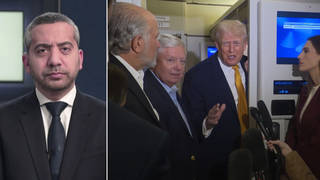
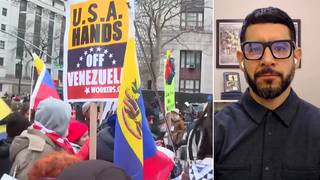


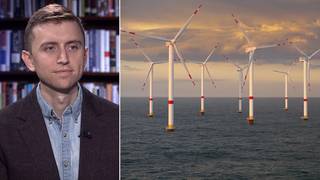
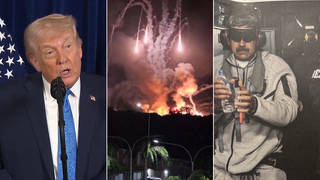
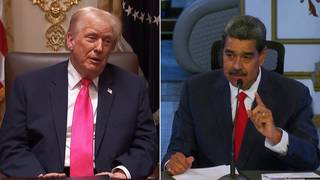
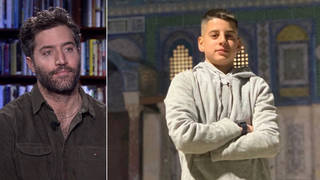



Media Options